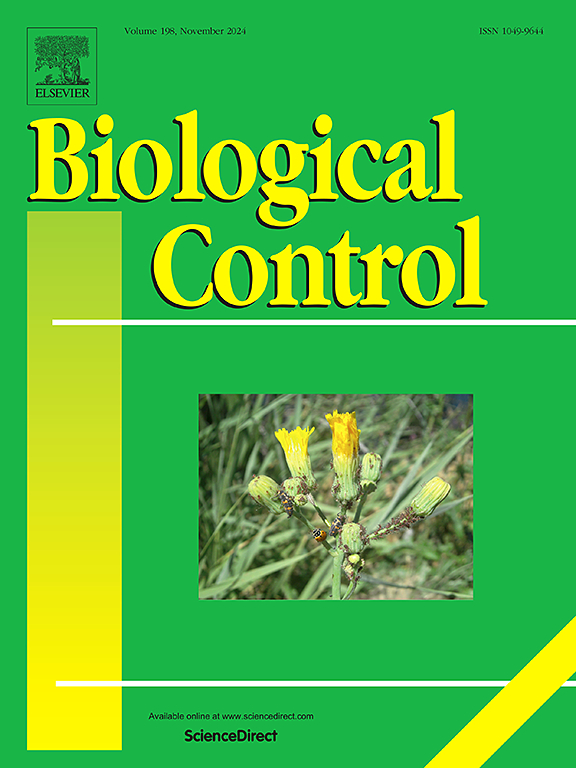探讨古巴小麦品种芽孢杆菌对镰刀菌的生物防治、抗旱和促进植物生长的作用
IF 3.4
2区 农林科学
Q2 BIOTECHNOLOGY & APPLIED MICROBIOLOGY
引用次数: 0
摘要
芽孢杆菌科的成员因其在干旱胁迫下促进植物生长的能力和产生对植物致病真菌具有拮抗活性的生物活性代谢物的能力而得到认可。在这项研究中,我们评估了从古巴小麦中分离出来的细菌菌株在逆境条件下抑制镰刀菌、耐受干旱胁迫和促进小麦发芽的潜力。从3份古巴小麦材料中共分离出150株细菌,并根据其较高的拮抗活性选择了15株菌株。这些菌株属于芽孢杆菌科,可以有效地减少小麦叶片上的镰刀菌症状。为了确定对干旱胁迫的耐受性,将分离物暴露于不同浓度的聚乙二醇(PEG) -6000中,显示出对20% PEG-6000的耐受性。此外,还对菌株进行了植物生长促进(PGP)和裂解酶生产的体外评价。所有细菌均检测到产氨、吲哚乙酸、氨基环丙烷羧酸脱氨酶和固氮;此外,每个菌株至少能产生五种酵素中的两种。菌株在干旱胁迫和镰刀菌侵染下均能促进小麦萌发;其中菌株TII-10、TII-19、TCG-6和TMG-6的效果最高。这些发现强调了这些菌株在镰刀菌感染和干旱双重胁迫下作为促进小麦生长的有效药剂的潜力,有助于提高小麦的可持续生产。本文章由计算机程序翻译,如有差异,请以英文原文为准。

Exploring Fusarium Biocontrol, drought Tolerance, and plant growth promotion by Bacillus strains from Cuban wheat varieties
Members of the Bacillaceae family are recognized for their ability to promote plant growth under drought stress and for their capability to produce bioactive metabolites displaying antagonistic activity against phytopathogenic fungi. In this study, we evaluated the potential of bacterial strains isolated from Cuban wheat accessions to inhibit Fusarium species, tolerate drought stress, and promote the germination of wheat under stress conditions. A total of 150 bacteria were isolated from three Cuban wheat accessions, and 15 isolates were selected based on their elevated antagonistic activity. These strains, belonging to the Bacillaceae family, effectively reduced Fusarium symptoms on wheat leaves. To determine tolerance to drought stress, the isolates were exposed to different concentrations of polyethylene glycol (PEG) −6000, showing tolerance to 20 % PEG-6000. Furthermore, the strains underwent in vitro evaluation for plant growth-promoting (PGP) and lytic enzymes production. Ammonia production, indoleacetic acid, amino cyclopropane carboxylate deaminase, and nitrogen fixation were detected in all bacteria; moreover, each strain produced at least two of the five lytic enzymes tested. The bacterial isolates promoted wheat germination under both drought stress and Fusarium infection; with the highest effects registered for strains TII-10, TII-19, TCG-6 and TMG-6. These findings highlight the potential of these strains as effective agents for the promotion of wheat growth under the dual stresses of Fusarium infection and drought, contributing to more sustainable wheat production.
求助全文
通过发布文献求助,成功后即可免费获取论文全文。
去求助
来源期刊

Biological Control
生物-昆虫学
CiteScore
7.40
自引率
7.10%
发文量
220
审稿时长
63 days
期刊介绍:
Biological control is an environmentally sound and effective means of reducing or mitigating pests and pest effects through the use of natural enemies. The aim of Biological Control is to promote this science and technology through publication of original research articles and reviews of research and theory. The journal devotes a section to reports on biotechnologies dealing with the elucidation and use of genes or gene products for the enhancement of biological control agents.
The journal encompasses biological control of viral, microbial, nematode, insect, mite, weed, and vertebrate pests in agriculture, aquatic, forest, natural resource, stored product, and urban environments. Biological control of arthropod pests of human and domestic animals is also included. Ecological, molecular, and biotechnological approaches to the understanding of biological control are welcome.
 求助内容:
求助内容: 应助结果提醒方式:
应助结果提醒方式:


